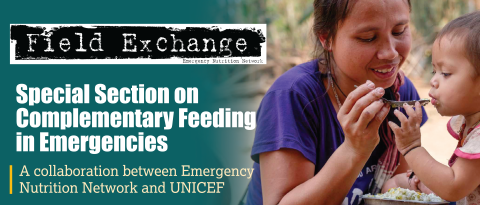Editorial
Dear readers,
A warm welcome to the 68th edition of Field Exchange. As we bring you this edition, the world is facing a series of challenges: climate crises, conflicts and economic shocks, including the ongoing economic fallout from the COVID-19 pandemic, now compounded by the war in Ukraine. These are all negatively affecting food security and the ability to access adequate and nutritious diets. As many as 828 million people go to bed hungry every night. The number of those facing acute food insecurity has soared since 2019 from 135 million to 345 million. A total of 50 million people across 45 countries teeter on the edge of famine.
These global crises are having a particular impact on the diets of young children, making our featured special section on complementary feeding in fragile and emergency contexts all the more timely. We are delighted to bring you this selection of articles in partnership with UNICEF, who share the latest programming guidance, research and learning obtained from multiple contexts. The global views piece by Moloney et al introduces this special section, outlining why efforts to improve young children’s diets are so important and how UNICEF is using a multi-systems approach to address this through their Action Framework. The special section of this print edition features 10 articles including field articles, case studies, views pieces and report summaries. You can also find additional articles online which complement this print edition to form a much larger special series.
In the broader issue, we feature several report summaries urgently calling for action in response to current global threats. The sixth Global Report on Food Crises recognises that the international community has stepped up to such calls in response to the need to mitigate famine, but that global humanitarian and development funding for food crises is failing to match growing demands. UNICEF’s Child Alert , issued in May 2022, highlights that, with child wasting rising rapidly, greater global prioritisation of both preventing and treating it is required as an essential child survival intervention. Furthermore, a report by Tearfund illustrates the competing – and urgent – demands on national priorities and budgets, with climate adaptation costs exceeding national spending on healthcare in 11 countries in sub-Saharan Africa. The report calls for the international community to honour climate finance promises already made to low-income countries to unleash the potential within communities to help themselves, autonomously and sustainably.
Two articles highlight the potential of cash transfers to enable vulnerable populations to adopt positive nutrition practices. Work by Save the Children in Yemen illustrates how unconditional cash transfers can increase household food security and child diet diversity, and may also increase adherence to wasting treatment if given upon graduation from treatment. An article from Kenya by Angood et al where cash transfers have been delivered in association with nutrition counselling, highlights the importance of strong linkages between social protection and nutrition systems for joint targeting and overall systems strengthening for more robust, effective delivery. In the current economic climate, social protection measures become an even more important mechanism for protecting the diets and health of vulnerable populations.
Investing in more and higher-quality data can support the effective targeting of appropriate interventions. We feature a pair of articles on the National Information Platform for Nutrition (NIPN) initiative, which was launched by the European Union in 2015. The views piece by Baille provides an overview of the initiative, as well as detailing the progress made and the lessons learnt from NIPN in nine countries to date. A field article by N’Dri et al. reports on the support NIPN has provided in establishing an effective multisector information system in Ivory Coast. As the authors point out, the task of developing an effective monitoring and evaluation system for multisector nutrition responses is formidable – it takes time, resources and dedication, alongside strong coordination and, above all, collaboration.
Ideally, cases of wasting are caught early to prevent deterioration to severe wasting, including in those individuals that may go on to require inpatient treatment. Community engagement and mid-upper arm circumference (MUAC) screening are crucial to this. An exploration of MUAC screening by caregivers in Mali, carried out by the International Rescue Committee, found key barriers include false preconceptions, the lack of tangible benefits and low social accountability. Potential strategies to overcome these barriers are being piloted and include active engagement of women’s groups, husbands and imams. When treatment for severe wasting is required, sensory stimulation and play therapy are recommended by WHO, but their use has rarely been documented. Experience from India, described here by Kamble et al, highlights the benefits of these activities for developmental milestones and the feasibility of their inclusion alongside standard inpatient treatment at the Nutrition Rehabilitation Centre at Bai Jerbai Wadia Hospital for Children, Mumbai.
Finally, as ever, we also provide a range of summaries and snapshots of the latest research, reports and news items from the field. Do check them out and don’t forget the bonus online articles from the complementary feeding in emergencies special section that don’t appear here in print, but are just as valuable reading.


